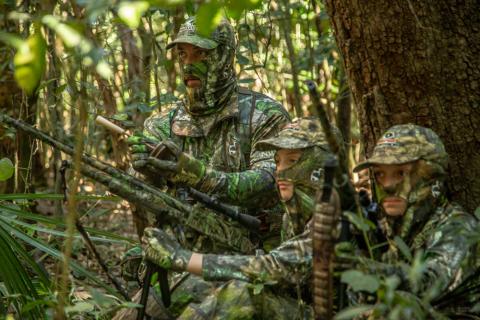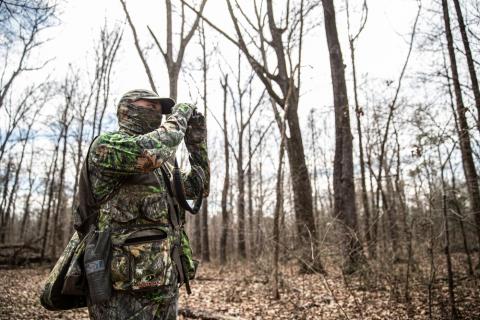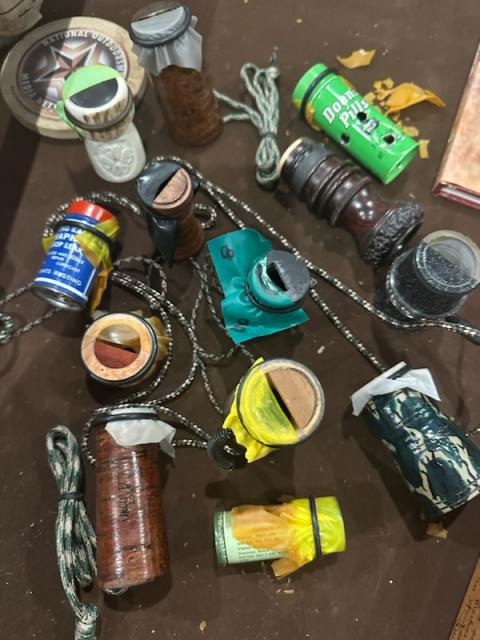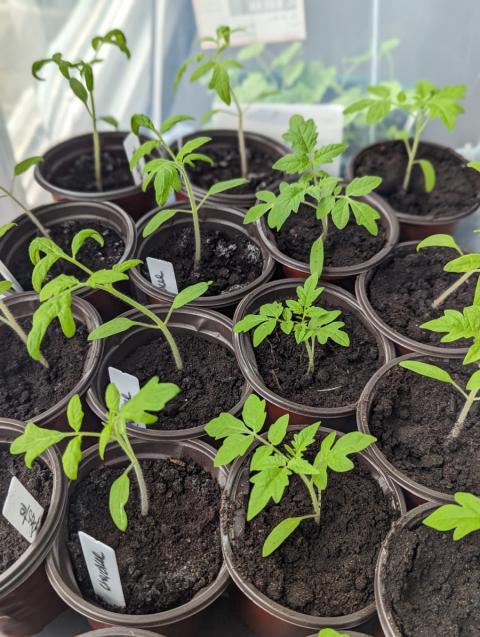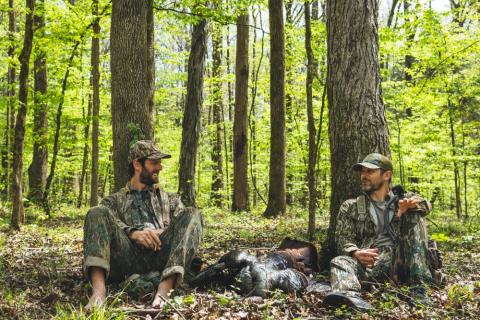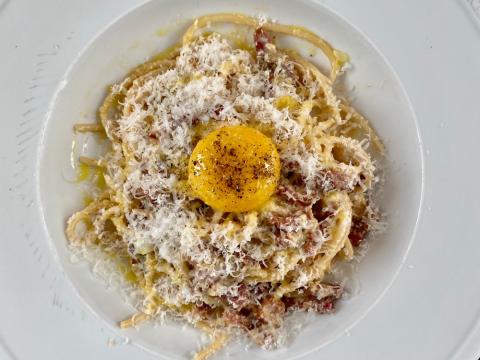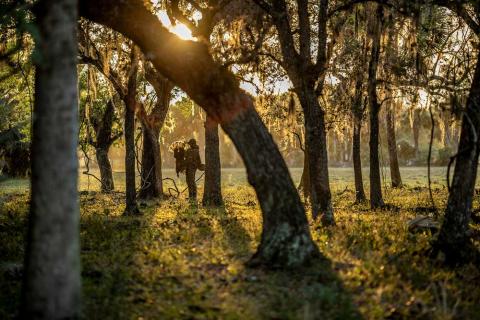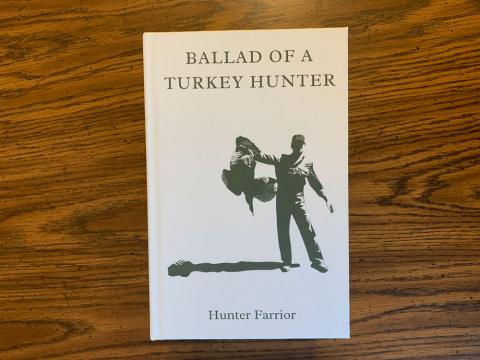provided by John E. Phillips
Editor’s Note: Many times we walk past giants and never see them. Such is the case with Will Jimeno of Chester, New Jersey, one of the last three people found alive after the terrorist attack on the Twin Towers of the World Trade Center (WTC) on September 11, 2001 when he was buried alive. As a first responder, he put his life on the line for others who didn’t survive.
According to Will, “During my recovery after 9/11, I went from a wheelchair to a walker to Canadian crutches and then to a cane. I still have to use a brace to walk, and I have a dropped foot. But as I look back over our ordeal, I feel fortunate. I still can enjoy bowhunting deer and chasing turkeys. Today I hunt out of ground blinds a lot, but I hunt from a tree stand sometimes.” Jimeno has a story to tell that we all need to hear, remember and then draw courage from what happened. This is how Will’s life had changed in 20 years.
Update on 9/11 Survivor Will Jimeno
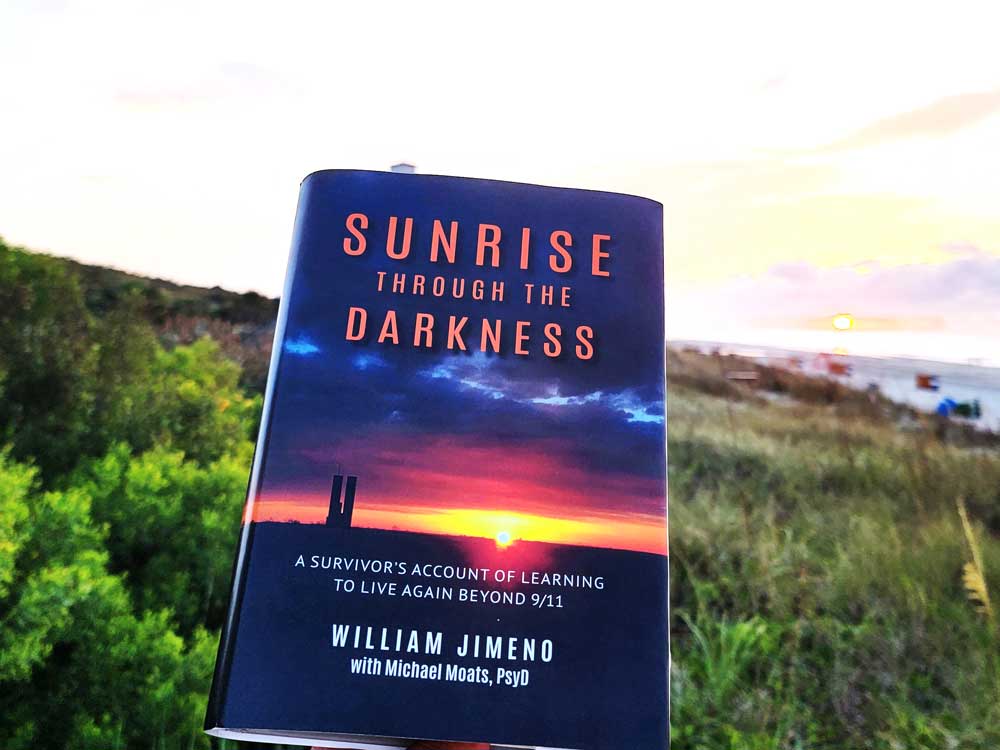
I’ve written two books, a children’s book titled “Immigrant American Survivor, A Little Boy Who Grew Up to Be All Three,” available on Amazon and Barnes & Noble. My children’s book is in both English and Spanish, and it’s also available at the 9/11 Museum in New York City. My adult book titled “Sunrise Through the Darkness: A Survivor’s Account of Learning to Live Again Beyond 9/11” is published by University Professors Press. In the last 20 years, I’ve been doing a number of speaking engagements, and that’s what led to the two books I’ve written.
I found there’s healing and more strength in me personally when I speak to different groups. My speaking has helped the people listening, too. Also, I’ve watched my two daughters grow into beautiful young women, and they’re both working to help people overcome tragedy. I’ve enjoyed the outdoors - both bowhunting and bowfishing. And, I’ve spent more time with friends and family than I did before 9/11. I’ve been really blessed. I’m often asked how the events of 9/11 change my life. What happened that day helped me focus on what was important in life, not that I didn’t know what was important before 9/11. But after 9/11, I was able to focus more on what’s important in life for me. Every morning when I wake up, I feel that I’m blessed to have another day to live. I don’t get mad anymore about things that once made me mad. I’ve quit looking at life in negative ways, and now I view life more positively. Also, I try to make the most of each day that I wake up, and I’m constantly reminding myself as a survivor of 9/11 that I have a responsibility to show other people how we can all survive any tragedy and live a good life.
Phillips: When we interviewed you several years ago, your oldest daughter was enrolled at Auburn University in Alabama. What’s she doing now?
She’s a graduate of the class of 2019, and my second daughter, Olivia, is now going into her sophomore year at Auburn University. We love the South, we love Auburn, and I’m very proud of both my daughters. My oldest daughter Bianca graduated with a journalism degree from Auburn, and she’s working in the area of social media and communications. My youngest daughter Olivia, besides working toward a degree in journalism, is very much into photography, and she also works at the Veteran’s Resource Center helping our veterans. Both my daughters are in communications because they believe, and I do too, that a communication degree gives them a much broader education to work in whatever area they choose. Both girls are representing our family at Auburn University in very positive ways.
Currently, I’m speaking to a wide variety of people at elementary schools, high schools, law enforcement, military groups, professional football teams and universities. I’ve been fortunate enough to speak with Auburn University’s football team, with the University of Mississippi’s football team and at Fairleigh Dickinson University in New Jersey. I’ve also spoken to the LA Rams and the Tennessee Titans professional football teams. Although I don’t speak to earn a living, I usually speak to about a dozen different groups a year.
As a Mossy Oak ProStaffer, bowhunting has always been one of my favorite things to do. I went on a video hunt in Texas this past year with “Ultimate Hunt” on the “Sportsman’s Channel” and took my biggest white-tailed buck ever with a bow on that TV show. This show highlights veterans and first responders and puts a positive light on the hunting community near where I live. I’ve just put out some trail cameras in August to get ready for the upcoming bow season. But I’m also spending a lot of time promoting both of my books because I think my children’s book will help children, and that “Sunrise Through the Darkness: A Survivor’s Account of Learning to Live Again Beyond 9/11” will help people move out of their darkness in what has happened to them into the light. Whatever a person feels is the darkness or the darkest part of their lives, my hope and dream is, if they read this book, it will show them how to move forward with the rest of their lives - whether they suffer from PTSD, sexual abuse, child abuse or addiction to drugs or alcohol. Whatever their darkness is in their lives, my book will give them a blueprint of how to help themselves.
9/11 Begins for Will Jimeno
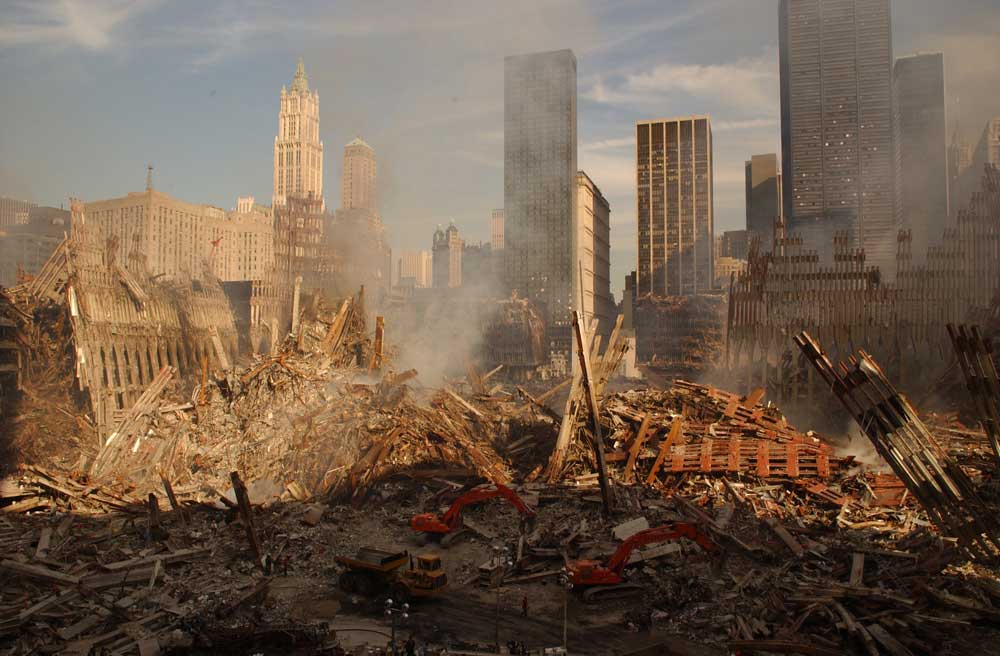
My mother and father had brought me from Colombia, South America, when I was 2 years old, and we were always told, “Be proud of where you’ve come from, but also realize where you are. We came to this country to live the American dream. So, we fly the American flag, you will learn English - the language of our new country – you will play by the rules of the United States, and you will serve this nation. We can’t go to another country and expect that country to change its rules, laws and regulations to accommodate us. The United States is now our country.” For that reason, when I was old enough, I joined the U.S. Navy and spent 4 years on the “USS Tripoli.” But even before I went in the Navy, I wanted to be a cop and serve the people who had allowed me and my family to come to America.
I fulfilled my dream of being a police officer by becoming a member of the Port Authority Police of New York and New Jersey. The Port Authority owned and operated the World Trade Center in New York City, as well as all the bridges, tunnels, bus terminals and major transportation facilities in the Northeast.
I woke up early on the Tuesday morning of September 11, 2001. I’d planned to take one of my personal day leaves to bowhunt for deer in a nearby wildlife management area. But then as I sipped my coffee, I thought to myself, “I really don’t need to take this day.” I decided to get ready and go into work, because I’d need some of my personal leave days when deer went into the rut later in the year.
I was 32 years old. I went into the city, and on 42nd Street and 8th Avenue in New York City, I watched thousands of people come into the bus terminal - one of the largest bus terminals in the country. My job was to patrol that area and protect people. I was under a big awning when I saw an unusually large shadow crossing the ground. On the corner, I saw Sgt. Ross and another officer with the Port Authority, Pat McInerney. Sgt. Ross was pointing to this object in the sky that just had flown over us. We didn’t know at that time that the object was the first plane to crash into 1 World Trade Center. We heard an explosion, and instantly all three of us got calls from headquarters for us to report to the police desk inside the bus terminal.
On the way, I met up with my buddy Dominick Pezzulo. When we arrived at the police station, Sgt. McLoughlin had a worried look on his face, and all of the officers were very busy. Dominick and I went to our breakroom where there was a big TV set and saw a picture of 1 WTC with this huge gaping hole in it. Right away I heard Sgt. Ross, who had been outside with us, announce, “That’s a terrorist attack.”
As police officers from the Port Authority, we are trained to do police work and as firefighters, because we’re the first to respond to any incident at the airport that’s close by. We’re also trained to deal with terrorism, since 1993, when the WTC had been attacked. With the bus terminal, the airport and the Twin Towers at the WTC all in close proximity to the Port Authority, we have to be prepared to deal with any type emergency that may occur.
As soon as I saw that the WTC had been attacked, I went straight to a pay phone and called my wife Allison and told her we were headed to the WTC to help. Someone had commandeered a bus, and all the officers - about 20 of us – loaded up on it to go to the WTC. We were about a block away from the WTC facing Vesey Street when we got out of the bus. Sgt. McLoughlin asked for volunteers.
Upon arriving at the WTC, the scene resembled what I thought the Battle of Armageddon would look like. We could see the hole in 1 WTC, and we saw that one corner of 2 WTC was on fire, after the second terrorist plane had crashed into 2 WTC. One of our senior officers pointed up and yelled, “Look, they’re jumping!” The last person I saw jump was a gentleman with tan pants, a pinkish shirt and blonde hair, and he jumped holding both hands out to his side like Jesus on the cross. We heard the screams of people as they jumped. I became a cop to serve and protect the people, but at that point I felt more helpless than I’d ever been in my life.
I heard Sgt. John McLoughlin, who was in charge of the rescue, yelling, “I need volunteers who know how to handle a Scott Air-Pak (those upside-down metal bottles that firemen wear on their backs attached to a full face shield that supplies air to firemen as they go in to smoke and burning buildings). Dominick Pezzulo, Antonio Rodrigues and I volunteered. We were in the same class at the Port Authority Academy and had just graduated. The three of us went with Sgt. McLoughlin and put on our Air-Paks. Our team of four then went into 1 WTC and immediately saw glass, debris, body parts and human remains everywhere. Sgt. McLoughlin also told us to get firefighter helmets and bunker coats (the heavy, fire-resistant long coats that firefighters wear).
As I looked back at 2 WTC, I could see large groups of people being herded out like cattle, thousands and thousands of people. Dominick and I got the helmets and the bunker coats - but the only size left was smalls, for little guys, and neither Dominick nor I fit the description of a little guy. While we were gathering up equipment, Dominick and I looked at each other and promised, “Okay, we’re not going to get separated; whatever happens, we’re going to stay together.” When we came out with the equipment, Sgt. McLoughlin was talking to a detective who had a piece of the plane in his hand. Then we asked Christopher Amoroso, who just had been transferred from the bus terminal to the WTC and who we had worked with before, to join us. Sgt. McLoughlin was a good cop, and he was someone I’d trust with my life and go through burning doors with him. Now we were a team of five. I was pushing the cart with the equipment in it. We went up one level to the mall level. Sgt. McLoughlin said, “We’re going to Tower Two to get more equipment from the emergency room there.”
As we walked toward 2 WTC, we saw more long lines of people walking in single file from 1 WTC. In the midst of the evil that had happened, I saw a lot of love. There were people dead on the ground, some injured, and people screaming, yet even with the amount of chaos all around us, we saw people helping people. One of the pictures I’ll never forget was a black gentleman and a white gentleman carrying a blonde-headed woman with a severe cut on her leg - all of them in a single file line. Once I saw that many people helping each other, I thought to myself, “I’m a uniformed officer, I should be doing more to help and defend.”
The World Caves in at the WTC on 9/11
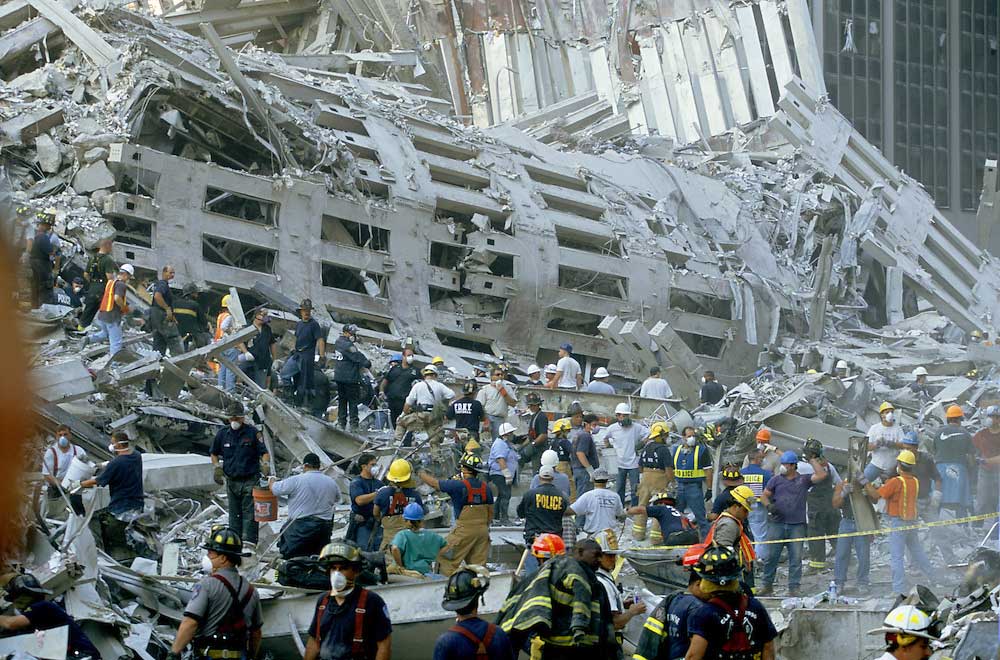
When our team of five Port Authority officers reached the lobby of 2 WTC, Sgt. McLoughlin told me, “Jimeno, you stay here. We’re going downstairs and talk to Officer Jimmy Lynch.” Lynch was in charge of the station at Tower Two. While I was standing in the lobby of 1 WTC, I could hear large chunks of concrete hitting the ground outside. Then I heard another sound and knew immediately what it was - bodies hitting the ground as more people jumped out of the flaming tower. Then someone said he saw the elevator shafts beginning to buckle in the basement level. About that time we heard a big boom! I turned around and looked into the lobby of 2 WTC where I saw glass breaking and a huge fireball, about the size of my house envelop the lobby of that tower. The ground shook like an earthquake.
We had stopped close to an elevator, and I heard Sgt. McLoughlin screaming, “Run, run toward the elevators!” I had learned long ago to follow a leader who can lead you into harm’s way and lead you back to safety, and that’s the reason I had asked Sgt. McLoughlin to be a part of his team. He was that kind of leader. We started running, and I found out later that a portion of 2 WTC fell straight down toward us. All the debris from that part of the tower as it fell pushed a huge cloud of debris toward us. In that split second, I thought, “Will, what did you get yourself into?” At the same time that thought hit me, I spotted Dominick Pezzulo and remembered the last thing we’d said to each other in the breakroom, “We’re not going to get separated and leave each other.” So, I started running after Dominick, and then the world caved in where we were.
I instantly felt a pain in my back, grabbed a radio and started screaming, “813 - Jimeno and team down. We’re getting bombarded with concrete.” Then something hit my hand and knocked the radio out of it. I grabbed my helmet to protect my head, but a sudden force so strong that it broke my chin strap blew the helmet off my head. Then everything seemed to stop. There was dead silence. I was in a dark place. I saw a little bit of light through a lot of dust.
After a short while, I heard Sgt. McLoughlin’s voice saying, “Sound off!” Sgt. McLoughlin was stuck in a fetal position behind a concrete wall below me. I had a lot of pain in my left side, and I could see Dominick face down in the push-up position right next to me. I finally figured out that a wall had fallen in on me, but Dominick was just packed in debris and didn’t seem to be injured. I yelled at Sgt. McLoughlin, “Jimeno,” and Dominick yelled, “Pezzulo.” I started screaming for Antonio (Rodrigues) and Chris (Amoroso), other members of our team of five, but I got no response. Later I learned they were both killed by debris. Finally Sgt. McLoughlin, Dominick and I realized that we needed to try and develop a plan to get out of the hole. But I also knew that Sgt. McLoughlin couldn’t get free from the wall that separated him and me.
However, Dominick Pezzulo told us, “I think I can get out.” As I watched, he squirmed his way out of the debris he was in and crawled over my face to get a little ways further up in the hole where we were all buried. Dominick asked me for a couple of breaths from my Air-Pak, and then he squirmed his way even further up the hole. I knew that Dominick probably could crawl out of the hole. Dominick yelled back to Sgt. McLoughlin, “Sarge, I believe I can get out of this hole and go for help.” But Sgt. McLoughlin said, “If you leave, you’ll never find us again!” Sgt. McLoughlin was a part of our SWAT team. He taught rappelling and all types of tactical defense and aggressive courses that tactical officers needed to know. He was responsible for the security at the World Trade Center.
Dom and I talked about what he should do. He yelled back to the sergeant and told him he was going to try and get me out from under the concrete. For the next 20 minutes, Dominick attempted to free me from the heavy debris. But a big piece of rebar (a steel bar used to reinforce concrete) was wrapped around me. Every time Dominick would pull on the rebar to try to free me, the rebar would fly back and hit me. Since my whole left side was being crushed, I was already in a lot of pain and didn’t feel I needed additional pain. At the end of 20 minutes of trying and then being totally exhausted, Dominick said, “Will, I don’t believe I’m going to be able to get you out.”
At that instant we heard a loud “boom,” and that’s when 1 WTC came down. I made the, “I love you sign,” with my fingers and then laid them across my chest. If I was ever found, my wife and children would know I was thinking about them before I died. Just as I put my arms across my chest, I heard something come down the hole, and it hit Dom. I heard McLoughlin scream. After the sound of the falling building faded away, I could hear Sgt. McLoughlin screaming in pain. I looked at Dominick and saw blood coming out of his mouth, and a huge piece of concrete was right in the center of his body. Dominick was only 3 to 3-1/2 feet away from me and told me, “Will, I’m dying.” I told him, “Man, hold on.” He cracked a joke and then said, “Will, don’t ever forget. I died trying to save you and the sergeant.” And, I said, “Don’t worry, Dom, I’ll never let anyone forget what you did for me and Sgt. McLoughlin.” Dominick pulled out his service revolver and shot up through the hole to hopefully let someone know we were alive and in the hole. After firing the shot, Dominick slumped over, and his weapon fell to the ground. That was one of the toughest times of my life.
Will Jimeno Gets Ready to Die
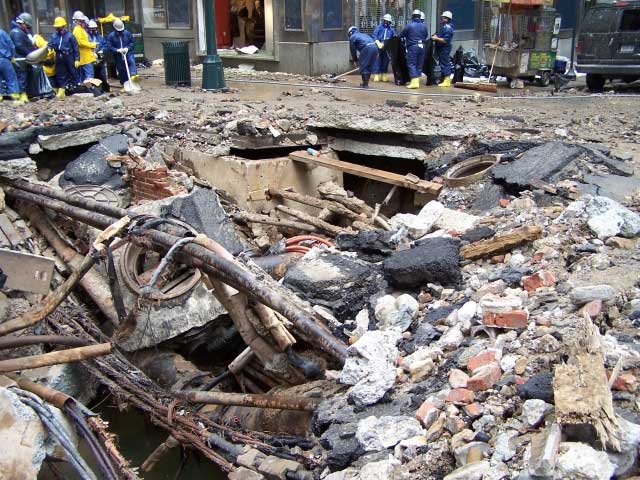
About 25 minutes to an hour after my friend Dominick Pezzulo died, while we were trapped at the World Trade Center on 9/11, fireballs started coming into the hole toward me. I realized if one of the fireballs hit my uniform I’d be burned alive. But the fireballs were putting themselves out just before they got to me. Later we learned there was cold air coming up from beneath us, and apparently the cold air kept putting out the fireballs. I know I saw a miracle happening just above me. A couple of those fireballs hit Dominick’s weapon, and I heard, “Pop, pop.” The fireballs were causing Dominick’s pistol to shoot at me. I put my hands over my face and hoped if a bullet hit that it would hit my hand and not kill me. Once the shooting stopped, I knew I was physically, mentally and emotionally exhausted. I yelled back to Sgt. McLoughlin, “Sarge, I can’t do this anymore.”
At that point, I made my peace with God and was ready to surrender my soul. I prayed, “God, thank you for 32 great years, for my beautiful wife Allison, for the 4 years I’ve been able to spend with my beautiful baby girl Bianca and for my parents who have taught me to be a good person and how to be a good American. Thanks for everything you’ve ever given me. If today’s the day I’m going to die, thanks for letting me die trying to serve people. When I get to heaven, please give me a drink of water, because I’m so thirsty. And, somehow and some way, if you take me today, let me look down from heaven and see my baby girl who hasn’t been born yet.” My wife was 7 months pregnant, and the thought of not being able to see my second child born hurt more than any of the physical pain I had to endure.
Then I closed my eyes. I was ready to give up. However, when I closed my eyes, I saw a vision - a figure walking toward me wearing a white glowing robe with no face, but with brown hair to his shoulders. Over his left shoulder, I could see a pond with trees around it, and there was a lot of peace there. Over his right shoulder was an endless sea of tall green grass waving with the wind. As I studied the vision coming toward me, I realized the vision was Jesus, and in His hand He had a bottle of water. I snapped out of that vision and knew I wasn’t going to die. If I died, it wasn’t going to be because I gave up. I told myself, “Will, if you die, you’re going to die trying to get out of this hole.”
Will Jimeno Determines Not to Let the 9/11 Terrorists Win
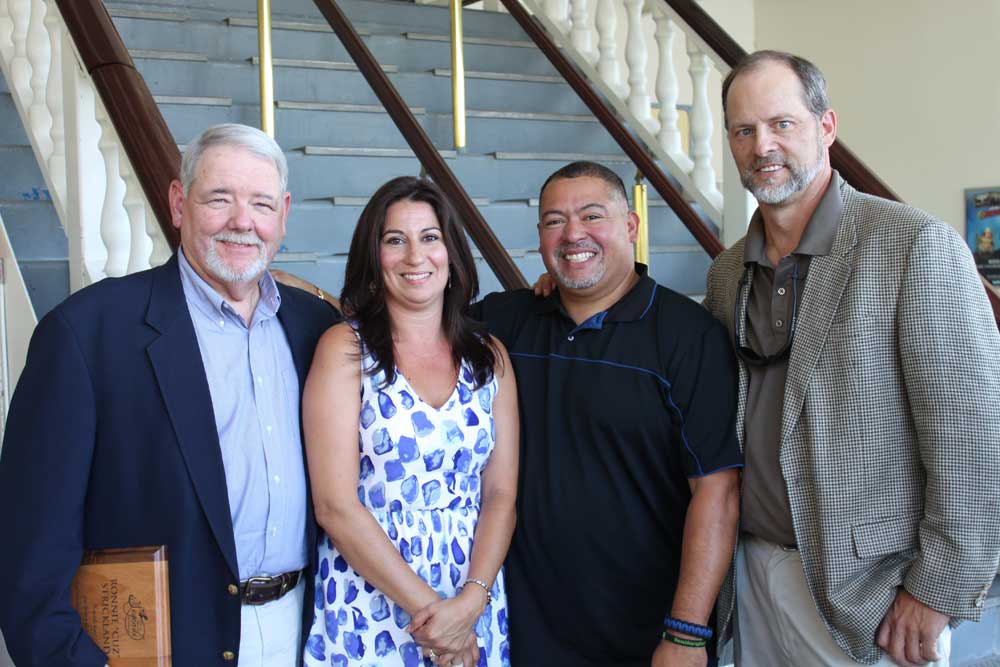
I yelled back to my Sergeant, “Sarge, we’re going to get out of this hellhole; we’re not going to let the terrorists win!” I also realized at that moment that if I died, then there was no hope for my sergeant who was 15 feet behind me. I was the only person who could yell for help for both of us. I also knew I would have let down my family, and more importantly, I would have given up on my country and let the terrorists win. Sgt. McLoughlin and I began to talk about our families and anything else to get away from the pain we were enduring. I was swollen up and looked like the Michelin Man from the tire commercial, only 10 times bigger. I tried to find any of the equipment I had on when the tower came down. I couldn’t locate my handcuffs, but I found my pistol. I realized that I couldn’t use my pistol, because I’d taken out the magazine with my bullets in it, so I wouldn’t be able to fire my weapon without thinking first. I used my pistol like a hammer to break the concrete and attempt to free myself. However, after putting it down, I couldn’t find my pistol again. About 7 p.m. on 9/11, our hole where Sgt. McLoughlin and I were became dark as night fell over what had been the Twin Towers of the WTC.
Will Jimeno Has Hope
About 8 p.m. on 9/11/2001, as Sgt. McLoughlin and I were trapped under concrete in the WTC, I heard someone near the hole screaming, “U.S. Marines!” Once the two marines (Jason Thomas and Dave Karnes) heard me and located the hole we were in, they stood by the hole, while an unknown civilian went to the police on the scene and came back with Scott Strauss, Paddy McGee and Chuck Sereika. Those three climbed down in the hole to me.
Scott Strauss, a NYC police officer, reached me first. He said, “Hold on, we’re going to work on you.” I was so excited I started hyperventilating. He gave me some water and told me, “You’ve got to concentrate and help us help you.” I answered, “I will!”
Once they started trying to get me out, the pain was so intense, I screamed loudly. But I realized if I screamed they wouldn’t get me out as quickly. Over the next 3 hours, I just shut-up and ate the pain. At one point during the rescue, they weren’t able to free my left leg, and I said, “Just cut if off.” I could see the hole 30 feet up and knew my sergeant below me needed medical assistance. That’s why I told them to cut my leg off. I learned later there were doctors standing by who were prepared to come down in the hole and amputate any limb that couldn’t be freed. However, Scott told me, “No, I’m going to get you out in one piece.”
Fire started falling in the hole again, and up above I heard men calling to the people helping Sgt. McLoughlin and me, “You’ve got to leave them and get out of the hole. Get out of the hole!” “We’re not going to leave them, even if it means dying with them,” the men agreed.
After 3 hours of the hardest work you could imagine, a stretcher was let down in the hole, and I was pulled up from the grave where I had been. As soon as I came out of the hole, I asked, “Where is everything?” “It’s all gone,” one of the firefighters told me. “It’s all gone, kid.” I started crying for the first time since the start of the whole ordeal, because I knew there were a lot of people still in the towers that we hadn’t been able to get out before the towers fell.
Then the rescuers passed me down between two lines of people on my stretcher toward the ambulance waiting for me. When the ambulance pulled up to the hospital, I began crying again. When I thought about all the people who had to have been hurt when the two towers at the WTC came down, I doubted that there would be any doctors or nurses to take care of me when they carried me into the hospital. But in the emergency room, I saw an army of doctors and nurses standing around me, and I asked, “Where are all the other people from the towers?” Then someone said, “You’re it.” Once more I started crying again when I began to think about all the people who didn’t make it to the hospital. I learned that the rescuers got to my sergeant after 22 hours of his being buried and pulled him out of the hole. Later I learned that only 20 people were pulled alive from the WTC.
I later found out that 30-year-old Genelle Guzman-McMillan, who was a secretary on the 64th floor of the North Tower WTC, and her colleagues knew something terrible had happened after the first plane hit 30 floors above them. As they slowly went down dozens of flights of stairs, on the 13th floor she stopped. Suddenly the building imploded, covering her with concrete and dust and a steel beam crushing her legs. Finally after 23 hours a rescue dog named Traker found her. Several hours later Genelle was pulled from the rubble – the last person rescued on 9/11.
I learned later that after the team got me out of the hole, about 18 other people went down in the hole and worked to get Sgt. McLoughlin free. I also learned from Chuck Sereika that the rescuers searched for other people under the debris for 3 weeks in areas like where they’d found Sgt. McLoughlin and me. But they never found anyone else. Sereika told me, “You two guys were the shining light for all the first responders and volunteers who worked so hard to discover other survivors.”
I also found out that when law enforcement took the 19th hijacker, Zacarias Moussaoui, over to the rubble of the Twin Towers and told him how many people had died from that attack, he was heard to say, “That’s good - I hope they all died.” One of the officers turned to him and said, “No, you didn’t kill us all,” because that trooper knew mine and Sgt. McLoughlin’s story. The trooper said, “Y’all killed a lot of people, but you didn’t break our spirit!” I realized after 9/11 that because Sgt. McLoughlin and I kept fighting to survive, the terrorists didn’t have a total victory. And by surviving, we cheated them out of being able to say, “We killed them all.” And the terrorists never will kill all Americans.
Will Jimeno Learns to Live Life Again
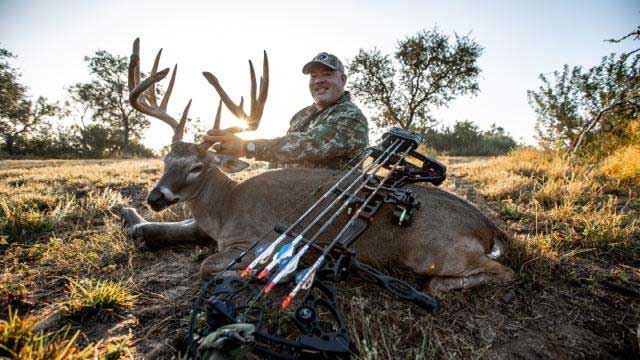
I was in ICU for 4 weeks, couldn’t hardly talk and was frustrated to let people know what had happened to our team. I was swollen – even my fingers - and barely could write. I used sign language to tell anyone and everyone who had been lost in the rubble what had happened to us there. No one explained that our Port Authority department had lost 37 officers, afraid of how the information would harm me mentally. Then some Port Authority friends brought in a poster and pointed out the people lost.
I hoped I wouldn’t die. I had eight surgeries in 2 weeks, was in excruciating pain constantly and had my leg laid open after the doctors cut away muscle tissue from compartment syndrome that caused my organs and muscles to shut down due to being crushed. I had to prepare myself for what would happen daily: more operations, skin grafting, which was horrible pain, and the uncertainty of living or dying. I prayed I’d survive another day. The medical staff was very concerned about blood clots and kept me on Coumadin.
Next I was transferred to the nationally known Kessler Institute for Rehabilitation in West Orange, New Jersey, for 6 weeks. In a wheelchair for 2 months, I graduated to a walker, then Canadian crutches and finally to a cane. The therapists at Kessler told me, “Work hard, and we’ll take you to the hospital to see your baby’s birth.” The ability to see new life through Olivia’s birth on November 26, 2001, after encountering so much tragedy and death renewed my spirit and gave me hope for the future. Quite a few months passed before I was able to become independent. For about 6 months, I couldn’t walk on my own. Even today I have a fear of falling, since my left foot catches on items and causes me to fall.
One thing I’ve learned is that life is short. You start off as a baby in diapers, and if you live long enough, you’ll be an older person in diapers. I became very depressed about my progress early in rehab. I always had loved the outdoors – especially hunting deer and turkeys – and had watched Toxey Haas and Ronnie “Cuz” Strickland from Mossy Oak on TV shows. I admired them. They appeared to be regular guys and the kind of people I’d like.
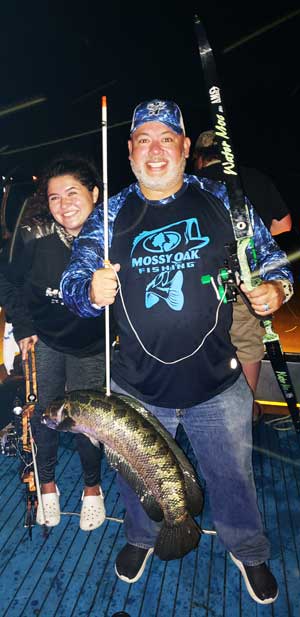 After a hard day in rehab in November, 2001, trying to determine how much function I could regain, and whether I’d ever walk again, I talked with my wife about how upset I was about not being able to hunt during the upcoming deer season, and maybe not ever being able to go hunting again. She called the people at Mossy Oak and told them about my condition. The next day I got a phone call and heard a voice say, “Hey, man. I'm Toxey Haas from Mossy Oak.” I got upset and started to cry. I completely fell apart. I couldn’t even talk. My wife took the phone and told Mr. Haas, “I'm sorry. Will is emotionally upset right now. But if you'll hold on just a minute, I know he wants to talk to you.” When I got back on the phone, Toxey said, “Hey, man. What’s up? Why are you crying?” I told him, “You're the head of Mossy Oak. For you to take time away from Mossy Oak to call and talk to me really means a lot to me.” Toxey responded with, “Hey, I'm just a redneck.” I answered, “No, that’s not true. You're an American, and you took your time to call me - a fellow American - in my time of need.” Toxey and I talked for awhile, and he really lifted my spirits. Soon after I talked to Toxey, “Cuz” called and told me, “Will, we’re sending some videos to you, so while you're in the hospital, you can watch our hunting DVDs. One day when you get well, we’ll go hunting together.”
After a hard day in rehab in November, 2001, trying to determine how much function I could regain, and whether I’d ever walk again, I talked with my wife about how upset I was about not being able to hunt during the upcoming deer season, and maybe not ever being able to go hunting again. She called the people at Mossy Oak and told them about my condition. The next day I got a phone call and heard a voice say, “Hey, man. I'm Toxey Haas from Mossy Oak.” I got upset and started to cry. I completely fell apart. I couldn’t even talk. My wife took the phone and told Mr. Haas, “I'm sorry. Will is emotionally upset right now. But if you'll hold on just a minute, I know he wants to talk to you.” When I got back on the phone, Toxey said, “Hey, man. What’s up? Why are you crying?” I told him, “You're the head of Mossy Oak. For you to take time away from Mossy Oak to call and talk to me really means a lot to me.” Toxey responded with, “Hey, I'm just a redneck.” I answered, “No, that’s not true. You're an American, and you took your time to call me - a fellow American - in my time of need.” Toxey and I talked for awhile, and he really lifted my spirits. Soon after I talked to Toxey, “Cuz” called and told me, “Will, we’re sending some videos to you, so while you're in the hospital, you can watch our hunting DVDs. One day when you get well, we’ll go hunting together.”
In 2003, Mossy Oak invited me to come to the Archery Trade Association (ATA) Show and to bring my wife. We hung out at the show with many of the people I’d seen on TV who were part of Mossy Oak. At that show, a hunt was auctioned off, sponsored by Mossy Oak and Primos Hunting. The person who bought the hunt was to go on a hunt with me, and the proceeds from that auction would go to the families of The Port Authority of New York and New Jersey’s 37 policemen who had lost their lives on 9/11. The late Dick Kirby, then the president of Quaker Boy Calls, bought the hunt. We were supposed to go hunting in 2004, but Mr. Kirby had some health issues, and we finally hunted together in January 2005, at Portland Landing in Alabama. I shared a camp with Mr. Kirby, “Cuz” and the Mossy Oak camera crew.
In 2006, Oliver Stone made a movie, “The World Trade Center” and in the movie, Nicholas Cage played Sgt. John McLoughlin, and Michael Pena played me. Sgt. McLoughlin and I were advisors for the movie. In the movie, some of the policemen and firefighters were actual policemen and firefighters who worked tirelessly to rescue us.
To make the movie as accurate as possible, Sgt. McLoughlin and I told our side of the story, and the rescuers told the story from their points of view. Although the movie came out in 2006, it’s still being used today as a teaching aid for police departments and being shown to school children. We’re proud that the movie about our tragedy is hopefully still helping people.
Today I hunt turkeys and deer as often as I can. But on some days, especially in the wintertime, I can’t get myself together and have to stay on the couch all day due to my injuries. I want to hunt turkeys, although I can’t walk far. Since my leg has been crushed, severing the nerves to my left foot, I have foot drop. I wear a brace on my left leg to enable me to pick up my foot and a compression garment also to keep my blood flowing. I still have numerous scars and a hole in my leg, resembling a shark bite.
But as I’ve mentioned earlier, I’ve had so many wonderful things happen with my family. I hope to be able to see my daughters with their families and have my wife Allison by my side. I plan to still represent the people who didn’t get out of the WTC and tell their stories about this dark yet victorious time in America’s history. I want young people to know who’s bought their freedom and allows them to live free and hunt.
















